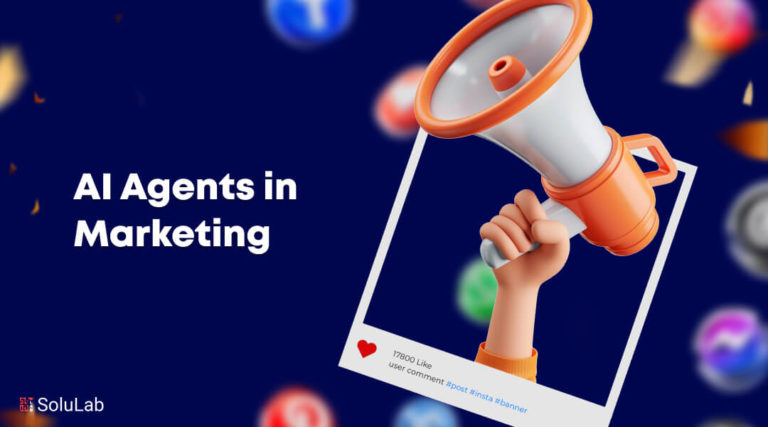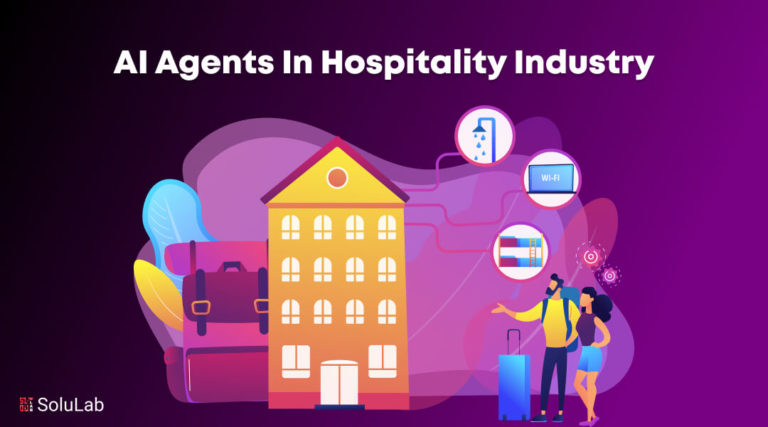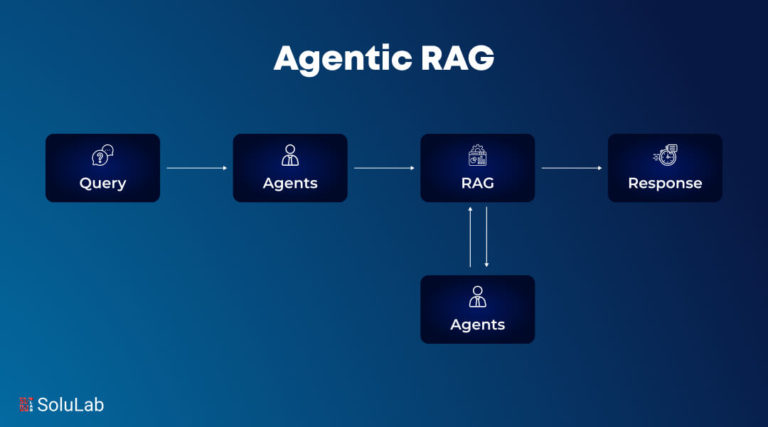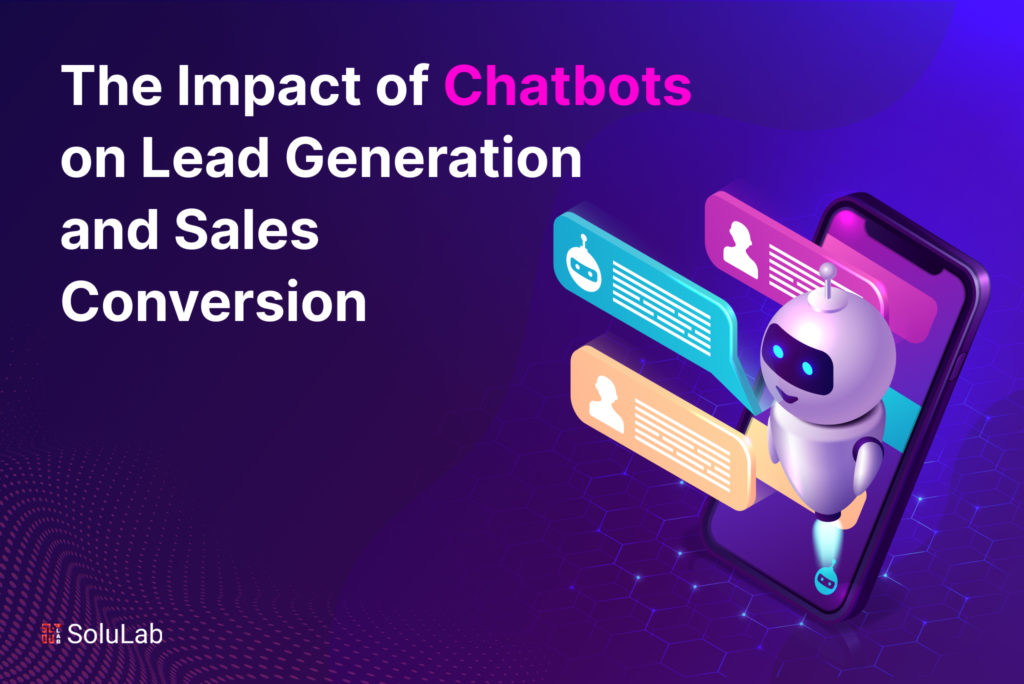
In today’s digital age, businesses are constantly seeking innovative ways to streamline their operations and improve customer engagement. The advent of chatbots has brought a new dimension to the world of lead generation and sales conversion. These virtual assistants, powered by artificial intelligence (AI), are becoming increasingly popular tools for businesses looking to enhance their customer service, capture leads, and boost sales. In this article, we’ll explore the role of chatbots in lead generation and sales conversion, focusing on strategies, their impact, and the crucial process of lead qualification.
Chatbots for Lead Generation: A New Frontier
Chatbots have evolved from being basic conversation tools to sophisticated agents capable of interacting with customers in meaningful and personalized ways. They have found their place in various industries, from e-commerce and customer service to healthcare and finance, and they are now an essential part of lead generation strategies.
Understanding Chatbots
Chatbots are nothing but AI-driven software programs designed to simulate human conversational behavior. They can communicate with users in a natural language, providing information, answering questions, and guiding them through specific tasks. In the context of lead generation, chatbots serve as proactive and 24/7 salespersons, ready to engage with potential customers whenever they visit a website or interact on social media platforms.
The integration of chatbots into lead generation strategies brings several advantages:
1. Real-time Engagement: Chatbots can initiate conversations with website visitors, capturing leads in real-time and offering immediate assistance.
2. Personalization: Through AI algorithms, AI-powered chatbots can tailor their responses and recommendations based on the user’s behavior and preferences, creating a more personalized user experience.
3. Scalability: Chatbots can handle multiple conversations simultaneously, ensuring that no lead is left unattended even during high-traffic periods.
4. Consistency: Chatbots provide a consistent level of service, ensuring that all visitors receive the same quality of information and assistance.
5. Data Collection: Chatbots can collect valuable data from users during conversations, helping businesses better understand their audience and fine-tune their lead generation strategies.
6. Cost-Effective: Using chatbots is often more cost-effective than hiring and training a large team of human agents for lead generation.
Implementing Chatbots for Lead Generation
The successful implementation of chatbots for lead generation depends on several key factors:
-
Clear Objectives
Before deploying chatbots, businesses must define their lead generation goals. Are they looking to increase the number of leads, improve lead quality, or both? Having clear objectives will guide the design and functionality of the chatbot.
-
Target Audience
Understanding the target audience is crucial. Businesses need to know who their potential customers are, what their pain points are, and what kind of content or assistance would be most valuable to them.
Read Blog Post: How to Build an AI-Powered Chatbot For Your Business?
-
Seamless Integration
Chatbots should seamlessly integrate with existing lead generation processes and technologies, such as CRM systems. This ensures a smooth transition of captured leads into the sales funnel.
-
Conversational Design
The chatbot’s conversational design plays a critical role in its effectiveness. It should be user-friendly, engaging, and capable of guiding users through the lead generation process.
-
Data Security
With data privacy concerns on the rise, it’s essential to implement robust security measures to protect the information collected by chatbots.
Lead Generation Strategies with Chatbots
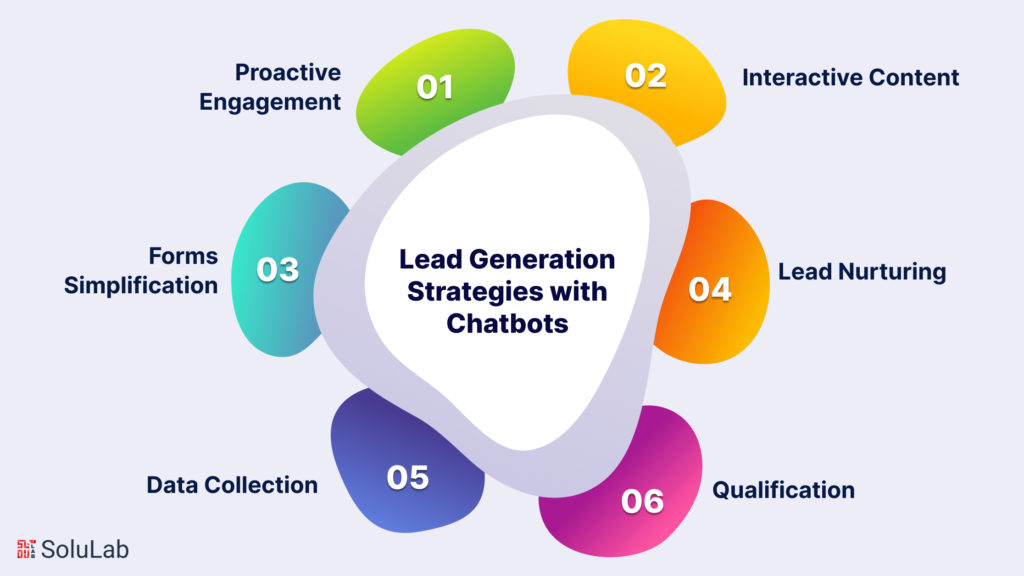
Incorporating chatbots into lead generation strategies requires careful planning and execution. Here are some effective lead generation strategies that leverage chatbots:
-
Proactive Engagement
Chatbots can initiate conversations with website visitors by asking if they need assistance or offering relevant information. This proactive approach can convert passive visitors into leads.
-
Interactive Content
Using chatbots to guide users through interactive content, such as quizzes or assessments, can be an excellent way to collect lead information while providing value to the user.
-
Forms Simplification
Chatbots can simplify the lead capture process by filling out forms on behalf of the user, making it more convenient and increasing the likelihood of lead submission.
Read Our Blog: Top 10 AI Development Companies in 2023
-
Lead Nurturing
Chatbots are not limited to initial lead capture; they can also engage in lead nurturing by sending follow-up messages, relevant content, and personalized recommendations to keep potential leads engaged.
-
Data Collection
Through natural conversations, chatbots can collect data about users’ preferences, pain points, and purchase intentions, helping businesses refine their lead generation strategies.
-
Qualification
Chatbots can assess lead quality by asking qualifying questions. This ensures that only the most promising leads are forwarded to the sales team, saving time and resources.
Chatbots and Sales Conversion: Bridging the Gap
While chatbots play a vital role in lead generation, their impact extends beyond the initial acquisition of leads. They can significantly contribute to the sales conversion process by assisting, nurturing, and qualifying leads.
-
Seamless Handover to Sales
Once a lead is captured by a chatbot, it can be seamlessly handed over to the sales team. Chatbots can provide sales representatives with a detailed lead profile, including the user’s preferences and interactions, enabling a more personalized and effective approach.
-
Lead Nurturing
Chatbots can continue to engage with leads, offering valuable content and assistance as they move through the sales funnel. This ongoing interaction keeps leads warm and increases the chances of conversion.
Check Out Our Press Release: SoluLab Launches Generative AI Consulting & Development Services to Help Clients Leverage the Strength of AI Technology
-
Sales Support
In the e-commerce industry, chatbots often assist users during the checkout process, answering product-related questions and addressing concerns. This real-time support can be the difference between an abandoned shopping cart and a successful sale.
-
Data-Driven Sales Insights
Chatbots can provide valuable data and insights to the sales team, such as the common pain points and objections raised by leads. This information can inform the sales strategy and help address potential concerns more effectively.
Lead Qualification with Chatbots: Separating the Wheat from the Chaff
One of the most critical aspects of lead generation is lead qualification. Not all leads are created equal, and businesses need to prioritize their efforts on leads with the highest potential for conversion. Chatbots are instrumental in this process.
-
Automated Lead Scoring
Chatbots can assign scores to leads based on their interactions, the information provided, and their behavior. This automated lead scoring system helps businesses identify which leads are most likely to convert.
-
Qualifying Questions
Chatbots can ask a series of qualifying questions to determine a lead’s readiness to make a purchase. These questions can be customized to suit the specific needs of the business and industry.
Read Our Blog Post: Top 10 AI Consulting Companies 2023
-
Behavioral Analysis
By analyzing the user’s behavior and engagement patterns, chatbots can assess the level of interest and commitment a lead has toward the product or service. This information guides the sales team in their approach.
-
Customer Segmentation
Chatbots can segment leads into different categories, such as hot leads, warm leads, and cold leads. Each category can receive tailored communication and marketing efforts.
-
Lead Routing
Chatbots can automatically route hot leads to the most experienced sales representatives, ensuring that the most promising opportunities are handled by the best-equipped team members.
Measuring the Impact of Chatbots on Lead Generation and Sales Conversion
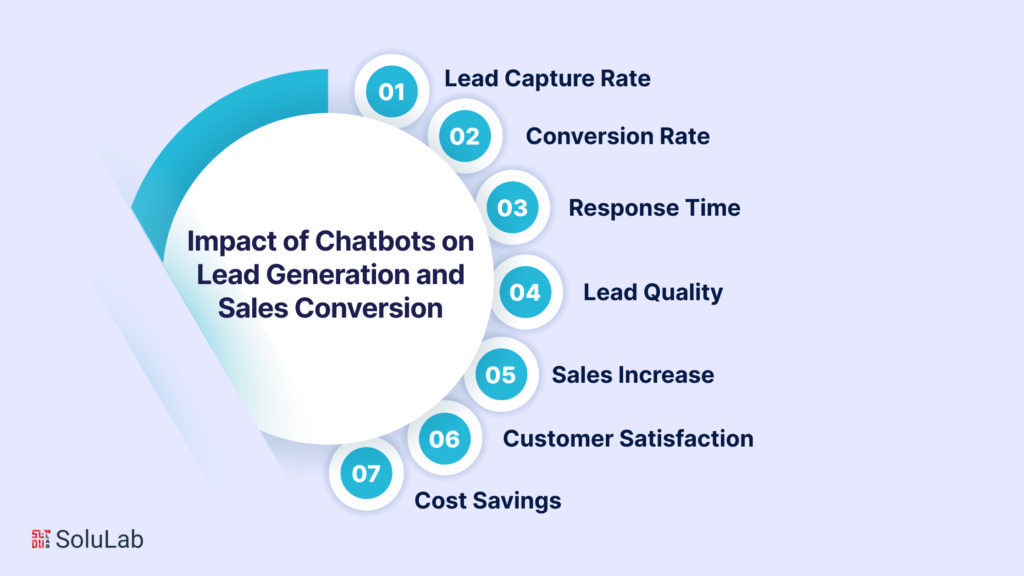
The impact of chatbots on lead generation and sales conversion can be measured through various metrics and KPIs. Here are some key performance indicators that businesses can track to evaluate the effectiveness of their chatbot strategies:
-
Lead Capture Rate
This metric measures the percentage of website visitors who engage with the chatbot and provide their contact information, thus becoming leads.
-
Conversion Rate
The conversion rate indicates the percentage of leads generated by the chatbot that eventually make a purchase or complete a desired action.
Check Out Our Blog: Top 10 Enterprise AI Development Companies
-
Response Time
A faster response time from the chatbot typically leads to better engagement and a higher likelihood of capturing leads.
-
Lead Quality
Evaluating the quality of leads generated by the chatbot is crucial. It’s not just about quantity; it’s about capturing leads with a genuine interest in the product or service.
-
Sales Increase
The ultimate goal of chatbots is to boost sales. Monitoring the increase in sales attributed to chatbot interactions is a clear indicator of their impact.
-
Customer Satisfaction
Feedback and satisfaction ratings from users who interacted with the chatbot can provide insights into its performance and effectiveness.
-
Cost Savings
Comparing the cost of implementing and maintaining a chatbot to the revenue generated can determine the ROI of chatbot-driven lead generation and sales conversion efforts.
Real-World Success Stories
To illustrate the real-world impact of chatbots on lead generation and sales conversion, let’s take a look at a few success stories from different industries.
-
E-commerce Giant: Amazon
Amazon uses chatbots on its website to assist customers in finding products, answering questions, and guiding them through the purchase process. These chatbots have significantly improved customer engagement and streamlined the buying process, resulting in higher conversion rates and increased sales.
Read Also: Top 10 AI Development Companies in 2023
-
HealthTech Startup: HealthBot
HealthBot, a health tech startup, developed a chatbot that provides users with personalized health and wellness recommendations. Users can input their health goals and receive tailored advice and product recommendations. This not only captures leads but also increases sales of related health products.
-
Software Company: Salesforce
Salesforce, a leading CRM software company, employs chatbots to qualify leads based on their website interactions. By asking a series of questions and analyzing user behavior, the chatbot identifies high-potential leads and routes them to the appropriate sales team, resulting in improved lead quality and higher conversion rates.
Challenges and Considerations
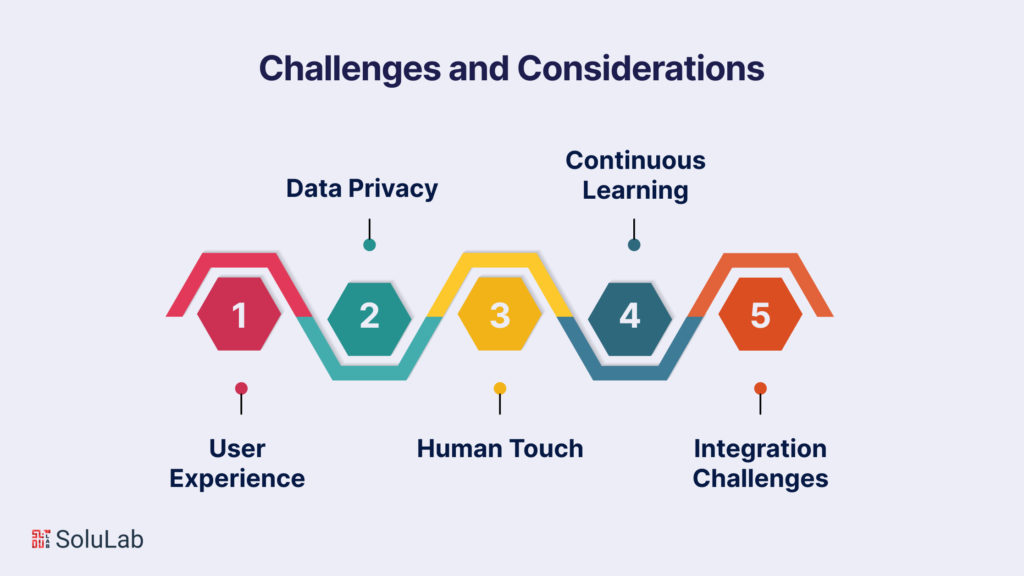
While chatbots offer numerous benefits for lead generation and sales conversion, businesses must also address certain challenges and considerations:
-
User Experience
A poorly designed chatbot can frustrate users and deter them from engaging further. It’s crucial to create a seamless and enjoyable user experience.
-
Data Privacy
Collecting user data comes with the responsibility of safeguarding it. Businesses must ensure that their chatbots adhere to data protection regulations and maintain user privacy.
Read Also: Top Artificial Intelligence Solution Companies To Explore in 2023
-
Human Touch
Chatbots can never fully replace the human touch in sales and customer service. They should complement, not replace, human interaction.
-
Continuous Learning
Chatbots must continuously learn and adapt to user behavior and preferences. This requires ongoing maintenance and updates.
-
Integration Challenges
Integrating chatbots with existing systems and processes can be complex. Ensuring a smooth flow of data and communication is essential.
The Future of Chatbots in Lead Generation and Sales Conversion
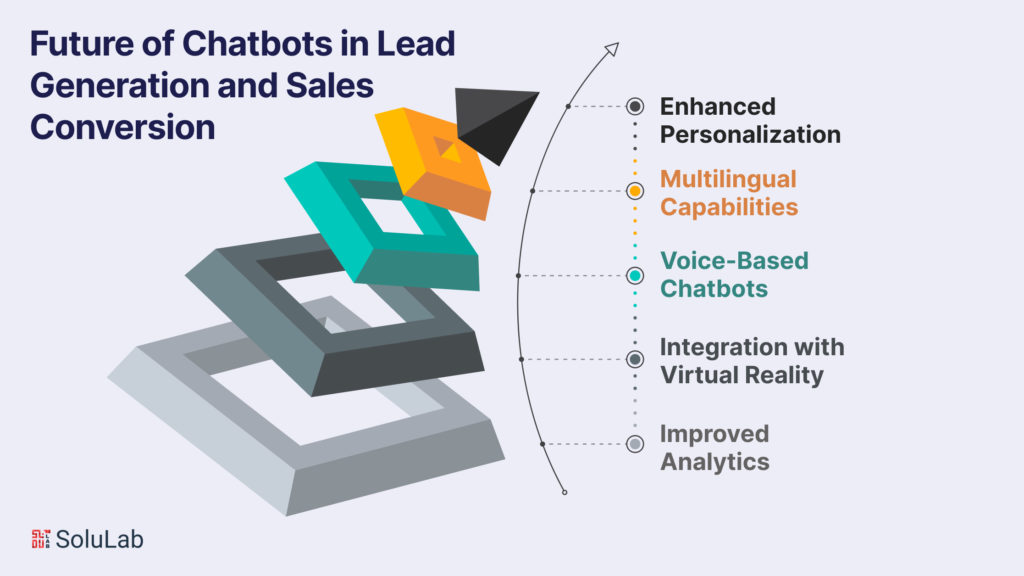
As technology continues to advance, chatbots are poised to become even more integral to lead generation and sales conversion. Here are some trends and developments to watch for in the near future:
-
Enhanced Personalization
Chatbots will leverage more advanced AI algorithms to deliver hyper-personalized experiences, catering to each user’s unique preferences and needs.
Know More: From Data to Business Success: Role of AI in Sentiment Analysis
-
Multilingual Capabilities
Chatbots will become more proficient in multiple languages, making them valuable tools for global businesses looking to capture leads from diverse regions.
-
Voice-Based Chatbots
The rise of voice assistants like Siri and Alexa will lead to the development of chatbots that can engage in voice-based conversations, opening up new opportunities for lead generation and sales.
-
Integration with Virtual Reality
Virtual reality and augmented reality will create opportunities for chatbots to interact with users in immersive, 3D environments, further enhancing the lead generation experience.
-
Improved Analytics
Chatbots will provide even more sophisticated analytics and insights to businesses, allowing for data-driven decision-making and improved lead-generation strategies.
Conclusion
Chatbots have emerged as powerful tools in lead generation and sales conversion. Their ability to engage users in real-time, streamline lead capture, nurture leads, and qualify prospects makes them indispensable in the modern business landscape. By carefully implementing chatbots and continuously improving their functionality, businesses can unlock new possibilities for growth, enhance customer satisfaction, and boost their bottom line. As technology continues to advance, the role of chatbots in lead generation and sales conversion is only expected to grow, making them an essential part of any forward-thinking business strategy.
SoluLab, a trusted company specializing in artificial intelligence development, offers pioneering AI solutions that cater to the unique requirements of diverse industries. Their proficient team of AI developers creates customized solutions, including intelligent chatbots, predictive analytics, and machine learning algorithms. Integrating chatbots into business processes and services provides a practical means to introduce automation and improve efficiency. SoluLab excels in providing chatbot development services, creating a variety of chatbots with innovative designs and robust architecture for industries such as eLearning, Healthcare, Fintech, and many more. Contact SoluLab for chatbot development.
FAQs
1. What is the role of chatbots in lead generation?
Chatbots play a pivotal role in lead generation by engaging with website visitors, capturing contact information, and initiating real-time conversations. They can proactively qualify and nurture potential leads, enhancing the overall lead-generation process.
2. How can chatbots improve sales conversion rates?
Chatbots can improve sales conversion rates by providing personalized recommendations, answering customer queries, and assisting during the purchase process. Their ability to offer round-the-clock support ensures that potential customers receive timely and relevant information, increasing the likelihood of conversion.
3. Are chatbots suitable for all industries and businesses?
Chatbots can be beneficial for a wide range of industries, including e-commerce, healthcare, finance, and more. However, their effectiveness depends on the specific business objectives and target audience. A well-designed chatbot can be customized to suit the needs of most businesses.
4. How do chatbots qualify leads, and what are the benefits of lead qualification?
Chatbots qualify leads by asking a series of predefined questions that assess the lead’s readiness to make a purchase. The benefits of lead qualification include prioritizing sales efforts, saving time and resources, and improving the chances of closing deals with high-quality leads.
5. What key metrics should businesses track to measure the impact of chatbots on lead generation and sales conversion?
Businesses should track metrics such as lead capture rate, conversion rate, response time, lead quality, sales increase, customer satisfaction, and cost savings to measure the impact of chatbots on lead generation and sales conversion. These metrics provide insights into the effectiveness and ROI of chatbot strategies.




